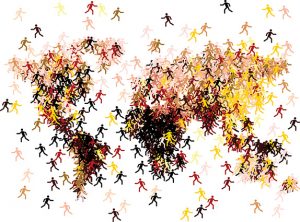
.
Image: radiocampuslorraine.com
Globally, the number of international migrants continues to increase. Yet, gaping health barriers continue to impede the realization of their right to health and undermine efforts in the fight against TB. In 2017 there were 258 million international migrants, an increase of 49% since 2000.[1]
Migrants face many barriers accessing health services, including TB prevention, testing, treatment and support, during transit and upon arrival in the destination country.[2] They are often also exposed to conditions which significantly increase their risk of TB, including detention in immigration centers, where they may not have access to adequate nutrition, sanitation, ventilation and TB testing and treatment.
Social and economic inequality and discrimination in law, policy and practice impedes migrants’ ability to safeguard their health, lives and well-being. Many migrants arrive in the destination country with low socioeconomic status, and may have insecure working arrangements (e.g., domestic workers), lack meaningful legal protection from occupational and safety hazards (e.g., miners), increasing their risk of acquiring TB and imposing challenges accessing health services.[3] Stigma, xenophobia and language and cultural barriers may lead to exclusion from and avoidance of health systems, including discriminatory treatment by health workers. Given these and other barriers, it is unsurprising that migrants experience disproportionately high rates of TB.
While most of the available research focuses on TB and migration from low- to high-income countries and not migration between low-income countries, the available data highlights the need to strengthen continuity of care across borders and ensure that legal frameworks enable migrants to access TB-related health services, including beyond initial entry into the destination country. A few relevant statistics:
- In 2005, two-thirds of the TB cases in Norway were among immigrants; TB rates were 7-9 times the general population.[4]
- A 2013 study of high-income countries found that foreign-born individuals made up over half of all TB cases with incidence rates 8.7-18.4 times that seen in the local-born population.[5]
- In 2014, more than half (62.4 %) of all TB patients in Germany were immigrants.[6]
- TB rates declined only gradually among Somali immigrants in Denmark during the first seven years,[7] highlighting the ongoing barriers faced by migrants and the need to address migrant’s determinants of health.
While legal barriers and discrimination impedes migrants’ ability to access health services, enabling laws provide an environment which safeguards their right to health. Not all legal frameworks are clear cut–in some countries the extent to which the law protects the right to health of migrants is unclear and/or not meaningfully enforced in practice.
The legal status of migrants in the destination country and lack of documentation are significant barriers, particularly for undocumented migrants who may also fear deportation, detention, or other punitive or adverse immigration implications if they seek health services.[8] Insufficient legal protection against discrimination, lack of clear provision in law guaranteeing the right to TB and other health services for migrants, lack of/non-realization of labour protections and occupational and safety standards, among other legal and policy barriers, create a situation in which migrants are at high risk of TB; yet are simultaneously excluded from public health systems.
In the lead up to the UN High-Level Meeting on Tuberculosis this September and beyond, and to meet Sustainable Development Goals to end TB by 2030, countries should review their immigration-related, public health, criminal, constitutional, non-discrimination and other relevant laws and policies against human rights standards, ensuring that they are enabling rather than punitive and discriminatory including by:
- Repealing laws which are discriminatory, punitive or have adverse immigration consequences for people with TB and/or communicable diseases (i.e. laws prohibiting entry or allowing for detention or deportation of migrants with TB, laws impeding the right to health services on the basis of legal status and/or having documentation); and
- Enacting, implementing and enforcing laws and policies which enable migrants to meaningful realize the right to the highest attainable standard of physical and mental health, inter alia, that:
- clearly provide for a justiciable right to health and access to health services for migrants;
- facilitate coordination of TB services across borders to ensure migrants have continuity of care;
- clearly provide for labour protections for migrants, including occupational health and safety standards, without adverse immigration or other consequences;
- address social determinants of health that increase the risk of TB for migrants including education, employment, housing, nutrition, sanitation and poverty, among others; and
- address language and cultural barriers within health systems.
[1] https://www.un.org/development/desa/publications/international-migration-report-2017.html.
[2] http://stoptb.org/assets/documents/resources/publications/acsm/KP_Mobile_Spreads.pdf.
[3] http://stoptb.org/assets/documents/resources/publications/acsm/KP_Mobile_Spreads.pdf.
[4] https://academic.oup.com/ije/article/34/5/1005/645880
[5] https://bmcmedicine.biomedcentral.com/articles/10.1186/s12916-016-0595-5.
[6] https://www.ncbi.nlm.nih.gov/pmc/articles/PMC4754836/.
[7] https://www.ncbi.nlm.nih.gov/pmc/articles/PMC2730343/.
[8] http://stoptb.org/assets/documents/resources/publications/acsm/KP_Mobile_Spreads.pdf.



